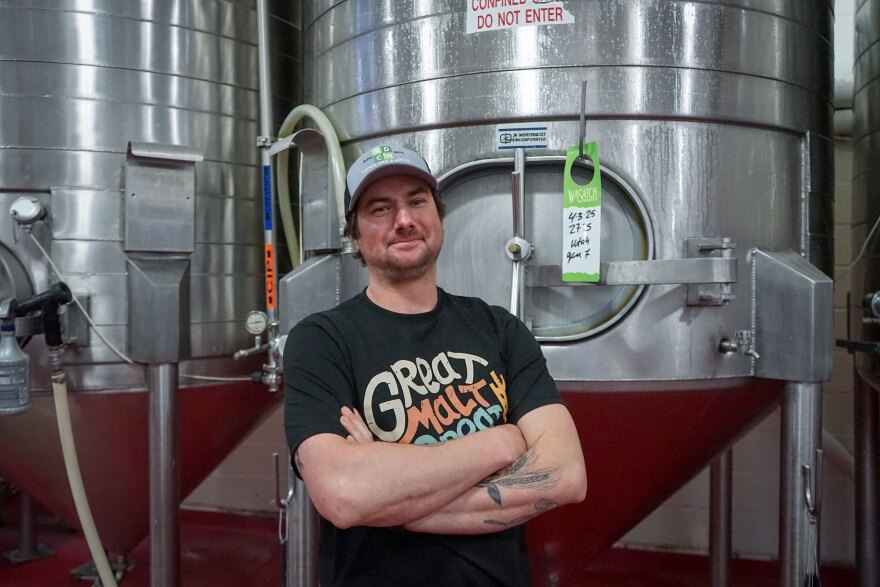Salt Lake City's Kiitos Brewing prides itself on its one-of-a-kind beers.
"We recently became the second brewery in the history of humankind to make a 100% Fonio beer," said Andrew Dasenbrock, president and CEO of Kiitos Brewing.

Fonio is a resilient, drought-resistant wheat grown in West Africa. And brews made with it don't look like other beers. There is no resemblance to a brown hue. Instead, the Fonio beer is nearly translucent with a distinctive taste, with hints of lychee and white grape.
"It's the most expensive grain we've ever purchased, because it is coming from West Africa," Dasenbrock said. "They've already kind of signaled that the price that we had been quoted will not likely be the price when it arrives."

That price swing is because of the Trump administration's tariffs. In April, the president slapped tariffs on about 90 countries. Since then, some products have been exempted while other tariffs have been postponed. The administration says trade agreements with some impacted countries are being negotiated.
Despite those talks, the effects of any tariffs still hang over the craft beer business. For Dasenbrock, the rapidly changing landscape makes it difficult to pinpoint what his expenses will be.
"Day by day, it's 10%, it's 50%, it's 1,000%. Oh, no, wait, just kidding, it's 10%," he said. "It's virtually impossible to predict what your costs are going to be in an environment like that."
What goes in beer
It takes a lot of grain to make beer, and brewers source it from domestic and international farms.
Once Nils Imboden, director of brewing operations for Salt Lake Brewing Co. and Top of Main, formerly known as Wasatch Brewing, heard about the tariffs, he started sending emails immediately trying to figure out how they would impact the business.
He knew the tariffs stretched across a variety of industries, including agriculture. Keeping a pulse on any agricultural impacts is crucial. Each month, Imboden said, they go through at least 10,000 pounds of barley, and they sell about 50,000 pints of beer.
"It's a good amount of beer," he said.

Even though the bulk of his barley comes from Idaho, and some imported grains are exempt, he still feels on edge.
"I think it's just the uncertainty of it all. As it stands now, barley for brewing is exempt from tariffs, but who knows how long that could last," Imboden said.
Beer is a global industry, whether it's hops from Germany or Fonio from West Africa. Like Kiitos, Imboden has the liberty to try some fun and weird stuff one wouldn't expect to taste in a beer, including Coconut Curry Kholsh and a Coalition Hellfire, which incorporates whatever spicy pepper is in season.
Tariffs can impact the creativity that consumers seek out in craft beer in the first place. For Kiitos that threatens the costs of its unique beers, like Fonio, or its Vanilla Nut Cream Ale that uses vanilla from Mexico or its Limoncello Sour with limoncello from Italy.
"That cost is already higher because of shipping, and now it's going to be exorbitantly higher because of tariffs," Dasenbrock said.
What beer goes in
Many beers come in cans, and the U.S. gets the vast majority of its aluminum cans from Canada. Trump has reshaped our relationship with the neighboring country through a 25% tariff and heavy political pressure.
"Our cost of cans are going to go up 10, 20%," Dasenbrock said.
Kiitos cans beer daily. To keep up with demand, Dasenbrock said he spends well over $20,000 on his shipment of cans. With the tariffs in place, he can expect to pay roughly $2,000 to $4,000 more per shipment.
Despite canned beer making up the majority of their sales, it also represents their lowest profit margin.
"The reason for those razor-thin margins are the cost of the aluminum can, the aluminum lid, the cost of the label, the cost of the labor to put the beer into cans," he said.

Imboden is in a little bit of a different boat. Salt Lake Brewing Co. and Top of Main beers are only available at their taproom and restaurant locations. But Utah liquor laws force them to can certain beers. If a beer is over 5% alcohol by volume, state code requires it to go in a can and not on tap.
If both Imobden and Dasenbrock could place more of their beer in kegs, they agree it would reduce canning costs significantly. But that power lies in the hands of the Utah Legislature.
Tariff price tag
In a global industry, tariffs are sure to do one thing, said Michael McCullough, an agribusiness professor at California Polytechnic State University whose niche is beer economics.
"Increased prices across the board," he said, which can smash a brewer's business.
That could be because the brewer didn't or can't plan ahead, or they don't have the physical space to store brewing equipment or materials. Imobden feels the latter.
"We don't have a massive warehouse where we could stockpile ingredients. We're bringing stuff in as we need it," he said. "We're at the mercy of the market."

If there are price hikes at every level of the brewing process, it leaves one simple economic question: Who swallows the cost? The business or the consumer? McCullough points out it's usually the consumer.
"Have you ever seen the price of beer go down? No," he said.
Dasenbrock and Imboden aren't sure if they are going to increase the cost of their brews yet. There's too much uncertainty. There have been talks about pausing some of the costlier specialty beers. If prices get too unsustainable, both brewers acknowledge that a price increase may be the only option to keep the doors open and the lights on.
But even then, beer isn't going anywhere.
"We're always gonna drink beer. That's not gonna go away," McCullough said. "It's just what beer are we drinking?"
Copyright 2025 KUER 90.1

